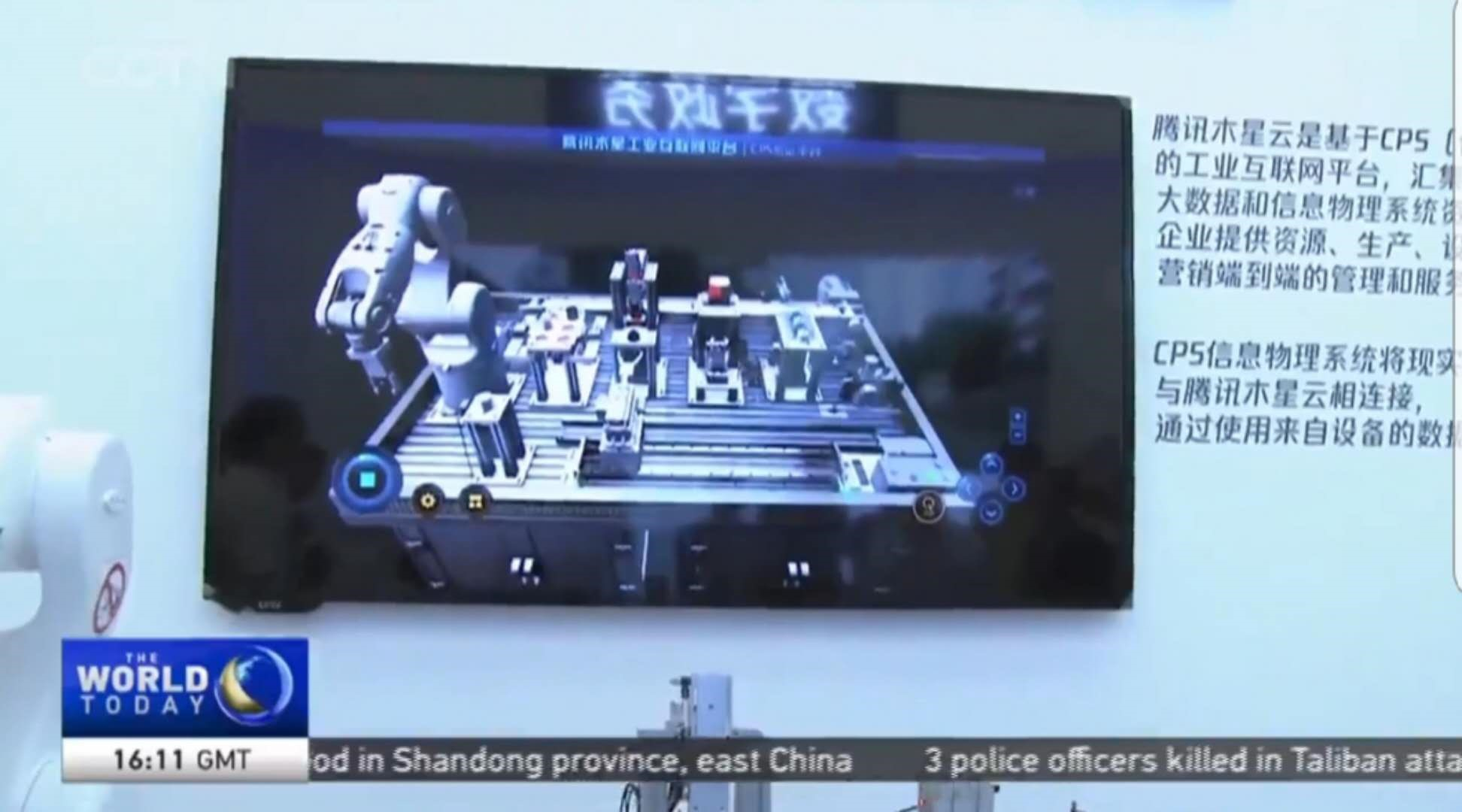
A cyber physical system platform used to monitor a company’s production lines (Photo: CGTN)
The First Smart China Expo 2018 held in southwest China’s Chongqing City ended after a three-day gathering and exhibition of government and business leaders, scholars and academicians.
As the name of the expo suggests, it is everything “smart” or unmanned, driven by artificial intelligence and big data to help people lead better lives. This comes as the country seeks to continuously move up the value chain, as well as counter a still-rising labor costs landscape.
In the near future, you may well receive your food delivery via a robot, and not via a delivery man.
This is what Meituan, China’s equivalent of Groupon, is trying to work toward. Food delivery accounted for over 60 percent of the company’s revenue in 2017.
Presently still at a testing stage, Meituan said more than 1,000 takeaway orders have been delivered by unmanned vehicles to Songjiang University. The company said this confirms the feasibility of an autonomous delivery within a large-scale operation area.
Meituan, which merged with Dianping in 2015 and recently filed for an IPO in Hong Kong, is incorporating AI and big data into its food delivery process, to make it more seamless and secure.
Other technological showcases
iFlytek Co. Ltd., China’s leading player in advanced speech recognition, has ventured into the medical space.
Its “Xiaoyi” robot, or “Little Doctor,” is presently used in a few hospitals as a way to advise patients. Using the keyed-in information regarding the patient's symptoms – such as a headache, high blood pressure, etc. – the robot can then recommend a list of doctors with whom the patient can make an appointment.
Meanwhile, Shenzhen Hualong Xunda Information Technology Co. Ltd. in collaboration with Tencent Cloud Computing will commercialize its cyber physical system platform soon. Basically, this platform is able to track a company’s production lines – across the food and tobacco industries – to increase operational efficiency.
“Whether it’s from pre-production – where the simulator can first monitor if standards can be met before the plant is put into operation – to monitoring the use of raw materials during production, to identifying mistakes during post-production… this real-time platform uses big data and AI to help bring down production costs,” said Zhang Yan, chief inspector of Shenzhen Hualong Xunda.
The two companies above – iFlytek and Shenzhen Hualong Xunda – told CGTN that their business operations are not affected by the ongoing China-US trade war.
This is because their software systems are home-grown and developed in China, and most – if not all – of their clients and sales are derived locally.
What do participants think of the Expo?
At the expo’s opening ceremony, Chinese Vice Premier Han Zheng said China should speed up the implementation of major AI projects, make breakthroughs on theory, as well as strengthen collaborative innovation.
Piero Scaruffi, the founder of Silicon Valley Institute of Artificial Intelligence, commends China’s great strides in its e-commerce, mobile payments and high-speed trains.
He, however, would like to see China not just spend more on R&D, but to spend it on building its very own technology, and “not just an imitation, per se, from Silicon Valley,” he told CGTN.
China in recent times has called for a sense of urgency to boost its core technology, with aims to have homemade chips used in smartphones account for 40 percent of the local market by 2025.
Professor Yu Xiong, chair professor of Newcastle Business School at Northumbria University, believes China can reach this goal, but he notes it’s not that critical.
“China should take advantage of the 4th industrial revolution rather than competing in the 3rd or 2nd. China is now focusing on airplanes, even if China can manufacture all of them, it’s still something that was invented half a century ago or even more than that – other countries already have that technology,” he said.
Professor Xiong Yu, who is also a director of Cocoon Networks, a firm that specializes in China-UK cross-border technology transfer, said while China still sees a gap in core technology, it does not necessarily have to have every single technology in its hands.
“Even UK, France, US do not have everything… if somebody else can do it better at this moment, we can save the money and invent something even better, something that does not exist. Then we exchange, and respect each other’s inventions. This way, I feel that China can even be more competitive,” he told CGTN.
All in, experts and scholars oppose the use of tariffs in a trade war. Instead, they strongly believe international cooperation is the way forward.


